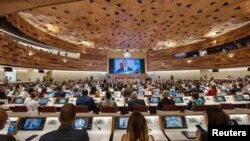Two Taiwanese reporters who had been accredited to cover this week's World Health Assembly in Geneva were told on Monday they would not be allowed to obtain their press passes in a move press freedom advocates say was likely caused by pressure from China.
On Monday, Judy Tseng and Tien Hsi-ju, reporters with Taiwan's Central News Agency (CNA), were blocked from covering the 76th World Health Assembly held by the World Health Organization (WHO), even though the reporters had their press credentials approved a week earlier.
This is the latest incident in which the World Health Assembly, or WHA, has denied media accreditation to Taiwanese nationals and media, which observers say underscores the intersection of press freedom and global politics. The WHA has regularly denied them accreditation since 2017, according to the press freedom group Reporters Without Borders, or RSF.
The WHA also rejected Taiwan's request to join the gathering this year.
A Central News Agency report on this week's incident written by Tseng and Hsi-ju cited a United Nations staff member who blamed the situation on pressure from China.
"They know everything," the staff member reportedly said.
Wanchi You, a member of the Association of Taiwan Journalists executive committee, said, "China has for years used its influence to restrict the participation of Taiwanese reporters in international events. And this limits the ability of Taiwanese media to report on global issues and undermines the principles of transparency, accountability and equal access to information."
The Chinese Embassy in Washington said it was "not aware of the specifics" of this week's WHA incident and directed VOA to China's Permanent Mission in Geneva, which did not immediately reply to VOA's email requesting comment.
Beijing claims Taiwan, a self-ruling island, as its own territory and perceives the accreditation of Taiwanese reporters at international events as an affirmation of Taiwanese sovereignty, RSF's East Asia Bureau Director Cédric Alviani said. Barring Taiwanese reporters from covering international events is just one way Beijing tries to isolate Taipei on the international stage.
The Association of Taiwan Journalists said in a statement, "It is imperative for the United Nations and its affiliated organizations to uphold the value of press freedom they endorse while urging the WHA to abstain from restricting journalists' interviewing rights based on their nationality."
Out of 180 countries, China ranks 179 in terms of press freedom, according to RSF. Taiwan ranks 35.
"We ask for the United Nations to respect the right of journalists to do their job irrespective of their nationalities,” a CNA spokesperson said in a statement. “The World Health Organization should mend its way by opening the proceedings of the current World Health Assembly to reporters from Taiwan."
"The United Nations headquarters are open to individuals in possession of identification from a State recognized by the UN General Assembly," Rolando Gómez, a spokesperson at the UN office in Geneva, told VOA in an emailed statement.
Taiwan is not a U.N. member state.
"The accreditation for journalists entering the premises of the United Nations (U.N.) in Geneva is handled by the U.N.," WHO spokesperson Margaret Harris said in an emailed statement. "The WHO secretariat made no decision related to the accreditation of reporters to the U.N. premises," including Tseng and Hsi-ju.
There was a period between 2009 and 2016 when Taiwanese reporters had an easier time covering these sorts of international events, according to RSF, but that period ended in 2017.
RSF's Alviani said that now Taiwanese reporters sometimes don't even bother requesting accreditation for these events because they assume they'll be denied.
"Somehow it's about Taiwanese sovereignty," Alviani told VOA. "I want to insist on the fact that we are talking of journalists. We are not talking about government representatives."
Alviani added that there is not a clear U.N. policy on how to handle these issues.
"It is inconsistent, it is discriminatory and it is unacceptable," he said.
U.S. State Department spokesperson Matt Miller said Washington was disappointed that Taiwan was not permitted to attend the WHA.
"We did strongly encourage the WHO to invite Taiwan to participate as an observer at the World Health Assembly," Miller said during a Thursday briefing. "We were disappointed that they decided not to do so."




